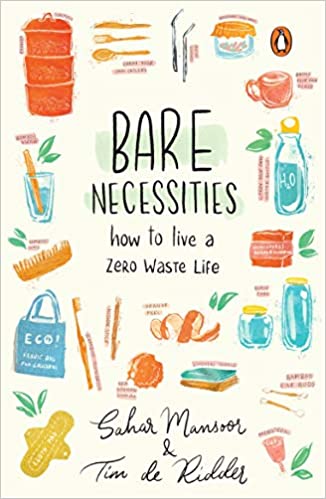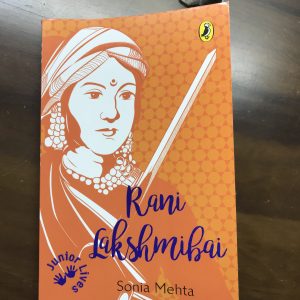A year into the pandemic and not yet outside it has taught us our own lessons. However, one of the overarching things that most of us have realized is that it is indeed possible to live with ‘just the bare necessities of life’! As a society we are more conscious of the footprints we are leaving on the earth, as much as we are concerned about what we are putting into our bodies and on them. It is against this background that Bare Necessities: How to Live a Zero-Waste Life by Sahar Mansoor and Tim de Ridder catches the pulse of the moment. Sahar helms the “Bare Necessities” brand which offers sustainable and zero waste alternatives to discerning customers. Tim is an Australian environmentalist. Both have brought their unique expertise into the book.
In a swoop, Bare Necessities: How to Live a Zero-Waste Life carries the reader into a world where a zero-waste lifestyle is coupled with creativity and respect for the self and the environment. Published by Penguin Random House India, the book takes the readers into the nuances of a zero-waste lifestyle. It is very practical in nature. You’ll be amazed at the number of DIY solutions that will drastically reduce the waste you produce in varied areas of your life. however, what is more poignant is that without moralizing or sermonising, the book gently prods you to look into your own life. It helps the reader gauge the little and countless ways by which he or she is contributing to the problem of waste. It then encourages the reader to think of alternatives that are kinder to the self and the environment!

Indeed, Bare Necessities is the need of the hour. Bookedforlife chats with the authors to know more about the book and the zero-waste lifestyle movement. Excerpts…
Top 3 things that people can do easily and right now to make that move towards zero-waste living.
There are so many, make sure to connect with our team on our website or social media channels to find out more, but to answer your question I think I will use one example from the first 3 chapters in our guide book. A little sneak-peek!
- Personal Care: Learn to DIY your own products such as toothpaste or soap. Alternatively connect with a sustainability organisation that retails earth friendly products.
- Closet: Pick ethical or slow fashion. You can also take part in clothes swap events.
- Kitchen: Buy local and seasonal products, and start composting any organic waste.
Now that ‘zero-waste lifestyle’ is a conscious goal for many people, there are also unscrupulous players within this arena. For example, brands may fool customers about conscious clothing (returning old clothes and getting discounts on new ones), which might just be another marketing gimmick. Another example is people claiming to sell ‘organic’ foods, or ‘biodegradable stuff’ that actually comprises of microplastics. The term here is “greenwashing’. How can customers see through this?
The best way to avoid being impacted by unscrupulous players is to undertake research on organisations. This can include both customer reviews, conversations with their staff if that is an available option, and professional reviews from well recognised media outlets. Chances are that the ones that are doing the right things will be more transparent and happier to share information when asked, that’s another great way to find out more.
This is a really pertinent question that is something to become more and more aware of in the coming years. Greenwashing is a core area of focus in our newest online course, Sustainability in 30, in fact.
The brand Bare Necessities offers products as well as courses for people who want to embrace a zero-waste lifestyle. Tell us about the response to these and what according to you is the level of readiness/acceptability of a more sustainable lifestyle amongst general public today?
My team and I are humbled by the response we get for many of the solution focused products and services we have created over the years. From our experience we have viewed more and more desire to become involved over the years. A prime example of this is the small number of individuals and organisations that were in the Indian sustainability industry when I created my business in 2016 compared to now. These days there are options in all major cities across the country and in a vast amount of other locations too.
I think the growth of communication tools and ways to share knowledge is a core point in this growth. With many enterprises like mine we have identified platforms such as Instagram and in face-to-face or webinar-based workshops to share knowledge. The response has blossomed with the amount of unique information we are able to share that relates to a wide range of individuals. It’s a really exciting time and something my whole team are really having fun being involved in.
I loved the DIY ‘recipes’ for personal products, food, cleaners and what not! Is there a product for which you wish you had an easier solution/DIY?
That’s a tough question; but perhaps completely plant based compostable packaging; compostable in a home composter, essentially in everyone’s backyard.
Since both of you have worked extensively in your respective countries, how would you compare the awareness/action towards zero waste lifestyle in India and Australia? Any salient points you may want readers to be aware of?
No matter where you are located in the world it is important to learn about the solutions that are currently being implemented. This is a core component that we focused on in our new guide book, Bare Necessities: How to Live a Zero Waste Life. By understanding what is occurring people can get involved and the more involvement there is the more solutions can be attained and/or found. It’s a build-up of processes, a step-by-step stage, that integral part of the circular economy.
I really think that is one of the largest things to remember, if you want to help address this environmental crisis that we are all apart of across the globe, choosing to become involved is the thing that matters no matter where you are based. The solutions may be location specific but the action in itself is tangible no matter whether you are standing in Australia or India, or anywhere else for that matter.
You are an inspiration to those on a journey towards a zero-waste life. What would be one lifestyle change that you would like to make in your own lives to further cement this ideology?
I think we have already started this next step of our process by releasing Bare Necessities: How to Live a Zero Waste Life. Now that the guide book is released we’d really like to see it make a positive impact and help change behaviours toward waste and resources. Additionally, we are hopeful that in the near future our publisher, Penguin Random House India, will be able to translate the text into a number of languages. This would make it even more accessible to people all across South Asia.
Reading Bare Necessities: How to Live a Zero-Waste Life does help the reader carve out a way towards a more mindful lifestyle that reduces waste. But, this book opens the reader’s eyes to a lot more. For one, you’ll realize how you are a part of the problem…and that the solution lies within you as well! In a simple but profound way, here is a book that can change the way you think. It is powerful and towards the end of it, you’ll know, that the change indeed begins with YOU!




